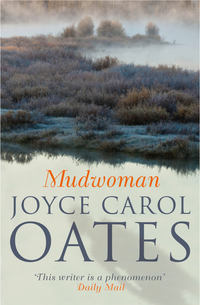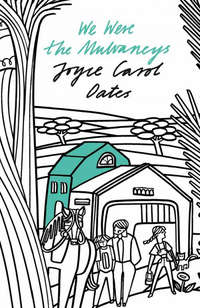
Полная версия
Mudwoman
It was not a distinguished or even an unusual bridge but an old-style truss bridge of the 1930s, with a single span: wrought-iron girders marked with elaborate encrustations of rust like ancient and unreadable hieroglyphics. Already M.R. knew, without needing to see, that the bridge was bare planking and would rattle beneath crossing vehicles; all of the bridge would vibrate finely, like a great tuning fork.
Like the bridges of M.R.’s memory, this bridge had been built high above the stream below, which was a small river, or a creek, that flooded its banks after rainstorms. To cross the bridge you had to ascend a steep paved ramp. Both the bridge and the ramp were narrower by several inches than the two-lane state highway that led to the bridge and so in its approach to the bridge the road conspicuously narrowed and the shoulder was sharply attenuated. All this happened without warning—you had to know the bridge, not to blunder onto it when a large vehicle like a van or a truck was crossing.
There was no shoulder here upon which to park safely, at least not a vehicle the size of the Lincoln Town Car, but canny Carlos had discovered an unpaved service lane at the foot of the bridge ramp, that led to the bank of the stream. The lane was rutted, muddy. In a swath of underbrush the limousine came to a jolting stop only a few yards from rushing water.
Some subtle way in which the driver both obeyed his impulsive employer, and resisted her, made M.R.’s heart quicken in opposition to him. Clearly Carlos understood that this was an imprudent stop to have made, within an hour of their destination; the very alacrity with which he’d driven the shiny black limousine off the road and into underbrush was a rebuke to her, who had issued a command to him.
“Carlos, thank you. I won’t be a—a minute …”
Won’t be a minute. Like stretch my legs this phrase sounded in her ears forced and alien to her, as if another spoke through her mouth, and M.R. was the ventriloquist’s dummy.
Quickly before Carlos could climb out of the car to open the door for her, M.R. opened the door for herself. She couldn’t seem to accustom herself to being treated with such deference and formality!—it wasn’t M.R.’s nature.
M.R., whom excessive attention and even moderate flattery embarrassed terribly; as if, by instinct, she understood the mockery that underscores formality.
“I’ll be right back! I promise.”
She spoke cheerily, gaily. M.R. couldn’t bear for any employee—any member of her staff—to feel uncomfortable in her presence.
As, teaching, when she’d approach a seminar room hearing the voices and laughter of the students inside, she’d hesitate to intrude—to evoke an abrupt and too-respectful silence.
Her power over others was that they liked her. Such liking could only be volitional, free choice.
She was walking along the embankment thinking these thoughts. By degrees the rushing water drowned out her thoughts—hypnotic, just slightly edgy. There is always a gravitational pull toward water: to rushing water. One is drawn forward, one is drawn in.
Now. Here. Come. It is time….
She smiled hearing voices in the water. The illusion of voices in the water.
But here was an impediment: the bank was tangled with briars, vines. An agonized twisting of something resembling guts. It wasn’t a good idea for M.R. to be walking in her charcoal-gray woolen trousers and her pinching-new Italian shoes.
Yet if you looked closely, with a child’s eye, you could discern a faint trail amid the underbrush. Children, fishermen. Obviously, people made their way along the stream, sometimes.
A nameless stream—creek, or river. Seemingly shallow, yet wide. A sprawl of boulders, flat shale-like rock. Froth of the hue and seeming substance of the most nouveau of haute cuisine—foam-food, pureed and juiced, all substance leached from it, terrible food! Tasteless and unsatisfying and yet M.R. had been several times obliged to admire it, dining at the Manhattan homes of one or another of the University’s wealthy trustees, who kept in their employ full-time chefs.
The creek, or river, was much smaller than the Black Snake River that flowed south and west out of the southern Adirondacks, traversing Beechum County at a diagonal—the river of M.R.’s childhood. Yet—here was the identical river-smell. If M.R. shut her eyes and inhaled deeply, she was there.
Here was an odor of something brackish and just slightly sour—rancid/rotted—decaying leaves—rich damp dark earth that sank beneath her heels as she made her way along the bank, shading her eyes against the watery glitter like tinfoil.
Mingled with the river-smell was an odor of something burning, like rubber. Smoldering tires, garbage. A wet-feather smell. But faint enough that it wasn’t unpleasant.
All that M.R. could see—on the farther bank of the stream—was a wall of dark-brick buildings with only a few windows on each floor; and beyond the windows, nothing visible. High on the sides of the buildings were advertisements—product names and pictures of—faces? human figures?—eroded by time and now indecipherable, lost to all meaning.
“‘Mohawk Meats and Poultry.’”
The words came to her. The memory was random, and fleeting.
“‘Boudreau Women’s Gloves and Hosiery.’”
But that had been Carthage, long ago. These ghost-signs, M.R. could not read at all.
Carlos was surely correct, they weren’t far from the small city of Ithaca—which meant the vast sprawling spectacular campus of Cornell University where M.R. had been an undergraduate twenty years before and had graduated summa cum laude, in another lifetime. Yet she had no idea of the name of this small town or where exactly they were except south and west of Ithaca in the glacier-ravaged countryside of Tompkins County.
It was a bright chilly October day. It was a day splotched with sumac like bursts of flame.
The not-very-prosperous small town of faded-brick storefronts and cracked sidewalks reminded M.R. of the small city in which she’d grown up in Beechum County in the foothills of the southern Adirondacks. Vaguely she was thinking I should have planned to visit them. It has been so long.
Her father lived there still—in Carthage.
She had not told Konrad Neukirchen that she would be spending three nights within a hundred miles of Carthage since virtually every minute of the conference would be filled with appointments, engagements, panels, talks—and yet more people would request time with M.R., once the conference began. She had not wanted to disappoint her father, who’d always been so proud of her.
Her father, and also her mother of course. Both the Neukirchens: Konrad and Agatha.
How painful it was to M.R., to disappoint others! Her elders, who’d invested so much in her. Their love for her was a heavy cloak upon her shoulders, like one of those lead-shield cloaks laid upon you in the dentist’s office to shield you from X-rays—you were grateful for the cloak but more grateful when it was removed.
Far rather would M.R. be disappointed by others, than to be the agent of disappointment herself. For M.R. could forgive—readily; she was very good at forgiveness.
She was very good at forgetting, also. To forget is the very principle of forgiveness.
Perhaps it was a Quaker principle, or ought to have been, which she’d inherited from her parents: forget, forgive.
Boldly now she walked on the bank of the nameless river amid broken things. An observer on the bridge some distance away would have been surprised to see her: a well-dressed woman, alone, in this place so impractical for walking, amid a slovenly sort of quasi-wilderness. M.R. was a tall woman whom an erect backbone and held-high head made taller—a woman of youthful middle-age with an appealingly girlish face—fleshy, flush-cheeked. Her eyes were both shy and quick-darting, assessing. In fact the eyes were a falcon’s eyes, in a girl’s face.
How strange she felt in this place! The glittery light—lights—reflected in the swift-running water seemed to suffuse her heart. She felt both exhilarated and apprehensive, as if she were approaching danger. Not a visible danger perhaps. Yet she must go forward.
This was a common feeling of course. Common to all who inhabit a “public” role. She would be addressing an audience in which there was sure to be some opposition to her prepared words.
Her keynote address, upon which she’d worked intermittently, for weeks, was only to be twenty minutes long: “The Role of the University in an Era of ‘Patriotism.’” This was the first time that M. R. Neukirchen had been invited to address the National Conference of the prestigious American Association of Learned Societies. There would be hostile questions put to her at the conclusion of her talk, she supposed. At her own University where the faculty so supported her liberal position, yet there were dissenting voices from the right. But overwhelmingly her audience that evening would support her, she was sure.
It would be thrilling—to speak to this distinguished group, and to make an impression on them. Somehow it had happened, the shy schoolgirl had become, with the passage of not so many years, an impassioned and effective public speaker—a Valkyrie of a figure—fiercely articulate, intense. You could see that she cared so much—almost, at moments, M.R. quivered with feeling, as if about to stammer.
Audiences were transfixed by her, in the narrow and rarified academic world in which she dwelt.
I am baring my soul to you. I care so deeply!
Often she felt faint, beforehand. A turmoil in her stomach as if she might be physically ill.
The way an actor might feel, stepping into a magisterial role. The way an athlete might feel, on the cusp of a great triumph—or loss.
Her (secret) lover had once assured her It isn’t panic you feel, Meredith. It isn’t even fear. It’s excitement: anticipation.
Her (secret) lover was a brilliant but not entirely reliable man, an astronomer/cosmologist happiest in the depths of the Universe. Andre Litovik’s travels took him into extragalactic space far from M.R. yet he, too, was proud of her, and did love her in his way. So she wished to believe.
They saw each other infrequently. They did not even communicate often, for Andre was negligent about answering e-mail. Yet, they thought of each other continuously—or so M.R. wished to believe.
Possibly unwisely, given the dense underbrush here, M.R. was approaching the bridge from beneath. She’d been correct: the floor was planking—you could see sunlight through the cracks—as vehicles passed, the plank floor rattled. A pickup truck, several cars—the bridge was so narrow, traffic slowed to five miles an hour.
She’d learned to drive over such a bridge. Long ago.
She felt the old frisson of dread—a visceral unease she experienced now mainly when flying in turbulent weather—Return to your seats please, fasten your seat belts please, the captain has requested you return to your seats please.
At such times the terrible thought came to her: To die among strangers! To die in flaming wreckage.
Such curious, uncharacteristic thoughts M. R. Neukirchen hid from those who knew her intimately. But there was no one really, who knew M. R. Neukirchen intimately.
In a way it was strange to her, this curious fact: she had not (yet) died.
As the pre-Socratics pondered Why is there something and not rather nothing?—so M.R. pondered Why am I here, and not rather—nowhere?
A purely intellectual speculation, this was. M.R.’s professional philosophizing wasn’t tainted by the merely personal.
Yet, these questions were strange, and wonderful. Not an hour of her life when she did not give thanks.
M.R. had been an only child. An entire psychology has been devised involving the only child, a variant of the first-born.
The only child is not inevitably the first-born, however. The only child may be the survivor.
The only child is more likely to be gifted than a child with numerous siblings. Obviously, the only child is likely to be lonely.
Self-reliant, self-sufficient. “Creative.”
Did M.R. believe in such theories? Or did she believe, for this was closer to her personal experience, that personalities are distinct, individual and unique, and unfathomable—in terms of influences and causality, inexplicable?
She’d been trained as a philosopher, she had a Ph.D. in European philosophy from one of the great philosophy departments in the English-speaking world. Yet she’d taken graduate courses in cognitive psychology, neuroscience, international law. She’d participated in bioethics colloquia. She’d published a frequently anthologized essay titled “How Do You Know What You ‘Know’: Skepticism as Moral Imperative.” As the president of a distinguished research university in which theories of every sort were devised, debated, maintained, and defended—an abundance like a spring field blooming and buzzing with a profusion of life—M.R. wasn’t obliged to believe but she was obliged to take seriously, to respect.
My dream is to be—of service! I want to do good.
She was quite serious. She was wholly without irony.
The Convent Street bridge, in Carthage. Of course, that was the bridge she was trying to recall.
And other bridges, other waterways, streams—M.R. couldn’t quite recall.
In a kind of trance she was staring, smiling. As a child, she’d learned quickly. Of all human reflexes, the most valuable.
The river was a fast shallow stream on which boulders emerged like bleached bone. Fallen tree limbs lay in the water sunken and rotted and on these mud turtles basked in the October sun, motionless as creatures carved of stone. M.R. knew from her rural childhood that if you approached these turtles, even at a distance they would arouse themselves, waken and slip into the water; seemingly asleep, in reptilian stillness, they were yet highly alert, vigilant.
A memory came to her of boys who’d caught a mud turtle, shouting and flinging the poor creature down onto the rocks, dropping rocks on it, cracking its shell….
Why would you do such a thing? Why kill …?
It was a question no one asked. You would not ask. You would be ridiculed, if you asked.
She had failed to defend the poor turtle against the boys. She’d been too young—very young. The boys had been older. Always there were too many of them—the enemy.
These small failures, long ago. No one knew now. No one who knew her now. If she’d tried to tell them they would stare at her, uncomprehending. Are you serious? You can’t be serious.
Certainly she was serious: a serious woman. The first female president of the University.
Not that femaleness was an issue, it was not.
Without hesitation M.R. would claim, and in interviews would elaborate, that not once in her professional career, nor in her years as a student, had she been discriminated against, as a woman.
It was the truth, as M.R. knew it. She was not one to lodge complaints or to speak in disdain, hurt, or reproach.
What was that—something moving upstream? A child wading? But the air was too cold for wading and the figure too white: a snowy egret.
Beautiful long-legged bird searching for fish in the swift shallow water. M.R. watched it for several seconds—such stillness! Such patience.
At last, as if uneasy with M.R.’s presence, the egret seemed to shake itself, lifted its wide wings, and flew away.
Nearby but invisible were birds—jays, crows. Raucous cries of crows.
Quickly M.R. turned away. The harsh-clawing sound of a crow’s cry was disturbing to her.
“Oh!”—in her eagerness to leave this place she’d turned her ankle, or nearly.
She should not have stopped to walk here, Carlos was right to disapprove. Now her heels sank in the soft mucky earth. So clumsy!
As a young athlete M.R. had been quick on her feet for a girl of her height and (“Amazonian”) body-type but soon after her teens she’d begun to lose this reflexive speed, the hand-eye coordination an athlete takes for granted until it begins to abandon her.
“Ma’am? Let me help you.”
Ma’am. What a rebuke to her foolishness!
Carlos had approached to stand just a few feet away. M.R. didn’t want to think that her driver had been watching her, protectively, all along.
“I’m all right, Carlos, thank you. I think….”
But M.R. was limping, in pain. It was a quick stabbing pain she hoped would fade within a few minutes but she hadn’t much choice except to lean on Carlos’s arm as they made their way back to the car, along the faint path through the underbrush.
Her heart was beating rapidly, strangely. The birds’ cries—the crows’ cries—were both jeering and beautiful: strange wild cries of yearning, summons.
But what was this?—something stuck to the bottom of one of her shoes. The newly purchased Italian black-leather shoes she’d felt obliged to buy, several times more expensive than any other shoes M.R. had ever purchased.
And on her trouser cuffs—briars, burrs.
And what was in her hair?—she hoped it wasn’t bird droppings from the underside of that damned bridge.
“Excuse me, ma’am …”
“Thanks, Carlos! I’m fine.”
“Ma’am, wait …”
Gallant Carlos stooped to detach whatever it was stuck to M.R.’s shoe. M.R. had been trying to kick it free without exactly seeing it, and without allowing Carlos to see it; yet of course, Carlos had seen. How ridiculous this was! She was chagrined, embarrassed. The last thing she wanted was her uniformed Hispanic driver stooping at her feet but of course Carlos insisted upon doing just this, deftly he detached whatever had been stuck to the sole of her shoe and flicked it into the underbrush and when M.R. asked what it was he said quietly not meeting her eye:
“Nothing, ma’am. It’s gone.”
It was October 2002. In the U.S. capital, war was being readied.
If objects pass into the space “neglected” after brain damage, they disappear. If the right brain is injured, the deficit will manifest itself in the left visual field.
The paradox is: how do we know what we can’t know when it does not appear to us.
How do we know what we have failed to see because we have failed to see it, thus cannot know that we have failed to see it.
Unless—the shadow of what-is-not-seen can be seen by us.
A wide-winged shadow swiftly passing across the surface of Earth.
In the late night—her brain too excited for sleep—she’d been working on a philosophy paper—a problem in epistemology. How do we know what we cannot know: what are the perimeters of “knowing”…
As a university president she’d vowed she would keep up with her field—after this first, inaugural year as president she would resume teaching a graduate seminar in philosophy/ethics each semester. All problems of philosophy seemed to her essentially problems of epistemology. But of course these were problems in perception: neuropsychology.
The leap from a problem in epistemology/neuropsychology to politics—this was risky.
For had not Nietzsche observed—Madness in individuals is rare but in nations, common.
Yet she would make this leap, she thought—for this evening was her great opportunity. Her audience at the conference would be approximately fifteen hundred individuals—professors, scholars, archivists, research scientists, university and college administrators, journalists, editors of learned journals and university presses. A writer for the Chronicle of Higher Education was scheduled to interview M. R. Neukirchen the following morning, and a reporter for the New York Times Education Supplement was eager to meet with her. A shortened version of “The Role of the University in an Era of ‘Patriotism’” would be published as an Op-Ed piece in the New York Times. M. R. Neukirchen was a new president of an “historic” university that had not even admitted women until the 1970s and so boldly in her keynote address she would speak of the unspeakable: the cynical plot being contrived in the U.S. capital to authorize the president to employ “military force” against a Middle Eastern country demonized as an “enemy”—an “enemy of democracy.” She would find a way to speak of such things in her presentation—it would not be difficult—in addressing the issue of the Patriot Act, the need for vigilance against government surveillance, detention of “terrorist suspects”—the terrible example of Vietnam.
But this was too emotional—was it? Yet she could not speak coolly, she dared not speak ironically. In her radiant Valkyrie mode, irony was not possible.
She would call her lover in Cambridge, Massachusetts—to ask of him Should I? Dare I? Or is this a mistake?
For she had not made any mistakes, yet. She had not made any mistakes of significance, in her role as higher educator.
She should call him, or perhaps another friend—though it was difficult for M.R., to betray weaknesses to her friends who looked to her for—uplift, encouragement, good cheer, optimism….
She should not behave rashly, she should not give an impression of being political, partisan. Her original intention for the address was to consider John Dewey’s classic Democracy and Education in twenty-first-century terms.
She was an idealist. She could not take seriously any principle of moral behavior that was not a principle for all—universally. She could not believe that “relativism” was any sort of morality except the morality of expediency. But of course as an educator, she was sometimes obliged to be pragmatic: expedient.
Education floats upon the economy, and the goodwill of the people.
Even private institutions are hostages to the economy, and the good—enlightened—will of the people.
She would call her (secret) lover when she arrived at the conference center hotel. Just to ask What do you advise? Do you think I am risking too much?
Just to ask Do you love me? Do you even think of me? Do you remember me—when I am not with you?
It was M.R.’s practice to start a project early—in this case, months early—when she’d first been invited to give the keynote address at the conference, back in April—and to write, rewrite, revise and rewrite through a succession of drafts until her words were finely honed and shimmering—invincible as a shield. A twenty-minute presentation, brilliant in concision and emphasis, would be far more effective than a fifty-minute presentation. And it would be M.R.’s strategy, too, to end early—just slightly early. She would aim for eighteen minutes. To take her audience off guard, to end on a dramatic note …
Madness in individuals is rare but in nations, common.
Unless: this was too dire, too smugly “prophetic”? Unless: this would strike a wrong note?
“Carlos! Please put the radio on, will you? I think the dial is set—NPR.”
It was noon: news. But not good news.
In the backseat of the limousine M.R. listened. How credulous the media had become since the terrorist attacks of 9/11, how uncritical the reporting—it made her ill, it made her want to weep in frustration and anger, the callow voice of the defense secretary of the United States warning of weapons of mass destruction believed to be stored in readiness for attack by the Iraqi dictator Saddam Hussein … Biological warfare, nuclear warfare, threat to U.S. democracy, global catastrophe.
“What do you think, Carlos? Is this ridiculous? ‘Fanning the flames’…”
“Don’t know, ma’am. It’s a bad thing.”
Guardedly Carlos replied. What Carlos felt in his heart, Carlos was not likely to reveal.
“I think you said—you served in Vietnam….”
Fanning the flames. Served in Vietnam. How clumsy her stock phrases, like ill-fitting prostheses.
It hadn’t been Carlos, but one of her assistants who’d mentioned to M.R. that Carlos had been in the Vietnam War and had “some sort of medal—‘Purple Heart’”—of which he never spoke. And reluctantly now Carlos responded:
“Ma’am, yes.”
In the rearview mirror she saw his forehead crease. He was a handsome man, or had been—olive-dark skin, a swath of silver hair at his forehead. His lips moved but all she could really hear was ma’am.








